Nsg 6420 week 2 - Study guides, Class notes & Summaries
Looking for the best study guides, study notes and summaries about Nsg 6420 week 2? On this page you'll find 449 study documents about Nsg 6420 week 2.
Page 4 out of 449 results
Sort by

-
NSG 6420 WEEK 2 QUIZ 2022 | NSG 6420 Midterm Exam 2022 | NSG 6420 Week 10 Final Exam | NSG6420 Adult Geriatrics Test Questions (All Answers Correct) and NSG 6420 / NSG6420 NSG 6420 Week 5 Midterm Exam - South University
- Package deal • 5 items • 2022
-
- $25.49
- + learn more
NSG 6420 WEEK 2 QUIZ 2022 | NSG 6420 Midterm Exam 2022 | NSG 6420 Week 10 Final Exam | NSG6420 Adult Geriatrics Test Questions (All Answers Correct) and NSG 6420 / NSG6420 NSG 6420 Week 5 Midterm Exam - South University

-
NSG 6420 WEEK 2 QUIZ 2022 | NSG 6420 Midterm Exam 2022 | NSG6420 Adult Geriatrics Test Questions (All Answers Correct) | NSG 6420 Week 10 Final Exam (Latest 2022) & NSG 6420 Week 5 Midterm Exam - South University.
- Package deal • 5 items • 2022
-
- $25.49
- + learn more
NSG 6420 WEEK 2 QUIZ 2022 | NSG 6420 Midterm Exam 2022 | NSG6420 Adult Geriatrics Test Questions (All Answers Correct) | NSG 6420 Week 10 Final Exam (Latest 2022) & NSG 6420 Week 5 Midterm Exam - South University.
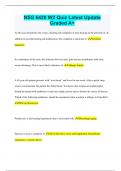
-
NSG 6420 W2 Quiz Latest Update Graded A+
- Exam (elaborations) • 4 pages • 2024
- Available in package deal
-
- $8.99
- + learn more
NSG 6420 W2 Quiz Latest Update Graded A+ An 86-year-old patient who wears a hearing aid complains of poor hearing in the affected ear. In addition to possible hearing aid malfunction, this condition is often due to: Cerumen impaction In examination of the nose, the clinician observes gray, pale mucous membranes with clear, serous discharge. This is most likely indicative of: Allergic rhinitis A 45-year-old patient presents with "sore throat" and fever for one week. After a quick...
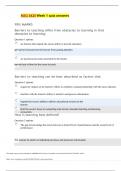
-
NSG 6420 Week 1 quiz answers
- Exam (elaborations) • 9 pages • 2024
-
- $8.99
- + learn more
NSG 6420 Week 1 quiz answers 95% MARKS Barriers to teaching differ from obstacles to learning in that obstacles to learning: Question 1 options: are barriers that impede the nurses ability to provide education are psychosocial issues presented by the learner Barriers to teaching can be best described as factors that Question 2 options: negatively impact on the learner's efforts to establish a mutual partnership with the nurse educator. interfere with the learner...
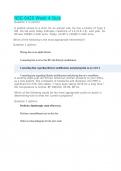
-
NSG 6420 Week 4 Quiz
- Exam (elaborations) • 6 pages • 2024
-
- $12.99
- + learn more
NSG 6420 Week 4 Quiz Question 1 (2 points) A patient comes to a clinic for an annual visit. He has a history of Type 2 DM. His lab work today indicates creatinine of 1.6 (0.6–1.5). Last year, his BP was 138/80 in both arms. Today, his BP is 150/80 in both arms. Which of the following is the most appropriate intervention? Question 1 options: Question 2 (2 points) A seventy-eight-year-old African American woman presents to your office as a new patient. She complains of headach...
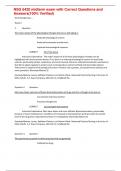
-
NSG 6420 midterm exam with Correct Questions and Answers(100% Verified)
- Exam (elaborations) • 157 pages • 2023
-
- $15.49
- + learn more
Gerontology Class…. Week 1: 1. Question : The major impact of the physiological changes that occur with aging is: Reduced physiological reserve Reduced homeostatic mechanisms Impaired immunological response CORRECT All of the above Instructor Explanation: The major impact of all of these physiological changes can be highlighted with three primary points. First, there is a reduced physiological reserve of most body systems, particularly cardiac, respiratory, and renal. Second, there a...
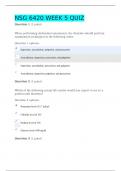
-
NSG 6420 WEEK 5 QUIZ
- Exam (elaborations) • 3 pages • 2024
-
- $9.99
- + learn more
NSG 6420 WEEK 5 QUIZ Question 1 (1 point) When performing abdominal assessment, the clinician should perform examination techniques in the following order: Question 1 options: Inspection, auscultation, palpation, and percussion Auscultation, inspection, percussion, and palpation Inspection, auscultation, percussion, and palpation Auscultation, inspection, palpation, and percussion Question 2 (1 point) Which of the following serum lab results would you expect to ...
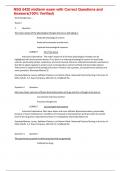
-
NSG 6420 midterm exam with Correct Questions and Answers(100% Verified)
- Exam (elaborations) • 157 pages • 2023
-
- $15.49
- + learn more
Gerontology Class…. Week 1: 1. Question : The major impact of the physiological changes that occur with aging is: Reduced physiological reserve Reduced homeostatic mechanisms Impaired immunological response CORRECT All of the above Instructor Explanation: The major impact of all of these physiological changes can be highlighted with three primary points. First, there is a reduced physiological reserve of most body systems, particularly cardiac, respiratory, and renal. Second, there a...
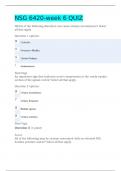
-
NSG 6420-week 6 QUIZ
- Exam (elaborations) • 3 pages • 2024
-
- $9.99
- + learn more
NSG 6420-week 6 QUIZ Which of the following disorders can cause urinary incontinence? Select all that apply Question 1 options: Cystocele Overactive Bladder Uterine Prolapse Endometriosis Next Page An important sign that indicates nerve compression at the cauda equina section of the spinal cord is? Select all that apply. Question 2 options: Urinary incontinence Urinary frequency Bladder spasms Urinary retention Next Page Question 3 (1 point) Saved All ...
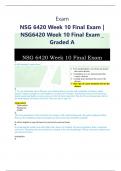
-
Exam NSG 6420 Week 10 Final Exam | NSG6420 Week 10 Final Exam _ Graded A
- Exam (elaborations) • 16 pages • 2023
-
- $13.99
- + learn more
Exam NSG 6420 Week 10NSG 6420 Week 10 Final Exam 1. In AR disorders, carriers have: • Two mutated genes; two from one parent that cause disease • A mutation on a sex chromosome that causes a disease • A single gene mutation that causes the disease • One copy of a gene mutation but not the disease 2. A 76-year-old patient with a 200-pack year smoking history presents with complaints of chronic cough, dyspnea, fatigue, hemoptysis, and weight loss over the past...

Did you know that on average a seller on Stuvia earns $82 per month selling study resources? Hmm, hint, hint. Discover all about earning on Stuvia


